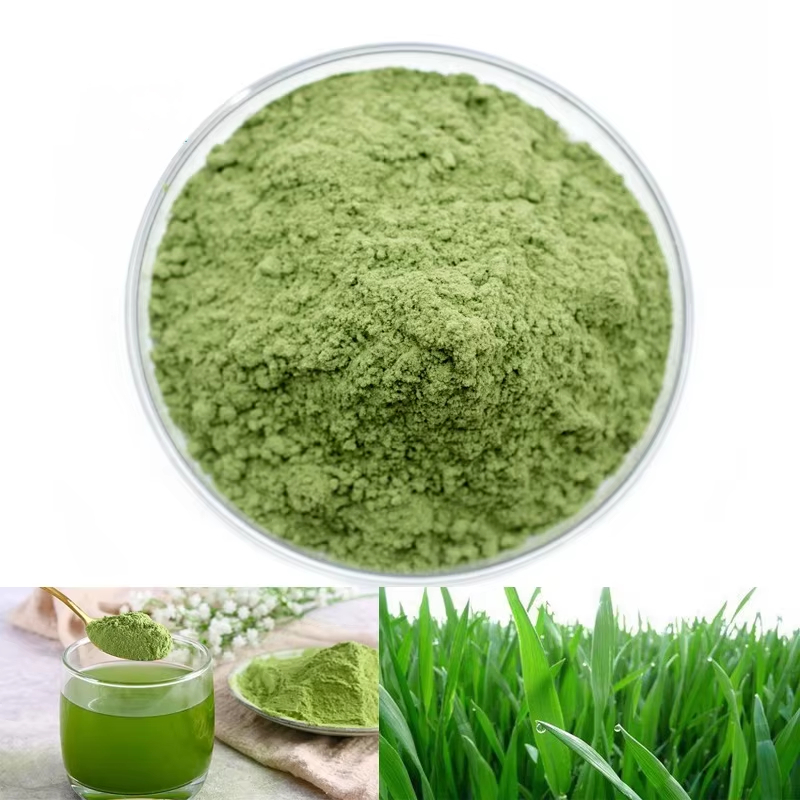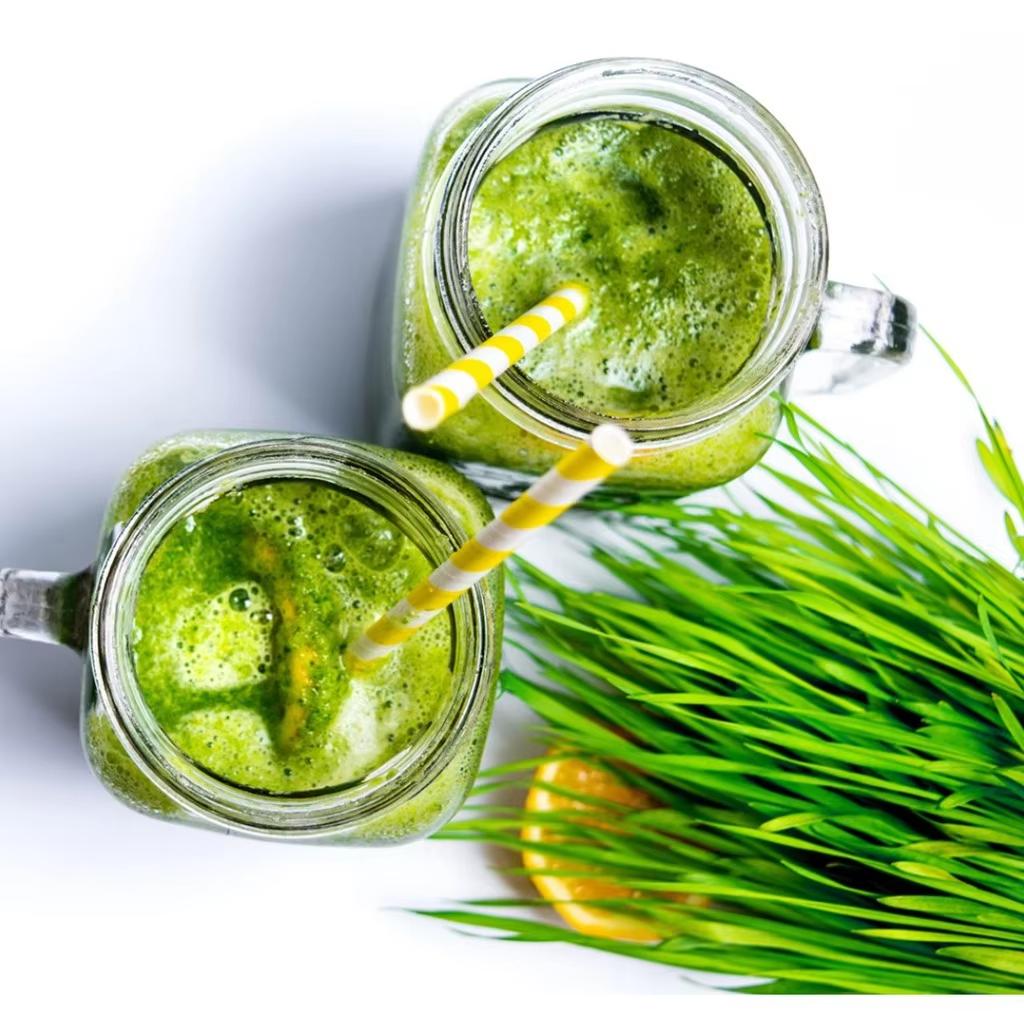Wheatgrass powder, derived from the young sprouts of wheat (Triticum aestivum), is often used as a dietary supplement due to its potential health benefits. Here are some of the benefits of wheatgrass powder:
Nutrient-Rich: Wheatgrass is rich in vitamins (such as A, C, and E), minerals (such as iron, calcium, and magnesium), and antioxidants, which contribute to overall health.
Antioxidant Properties: The antioxidants in wheatgrass help fight oxidative stress and reduce inflammation in the body.
Detoxification: Wheatgrass is believed to support the body’s natural detoxification process, helping to eliminate toxins and improve liver function.
Digestive Health: Due to its high fiber content, it may aid digestion and help promote a healthy intestinal environment.
Immune Support: The vitamins and minerals in wheatgrass help boost the immune system, making the body better able to fight infection.
Energy Boost: Many people report increased energy levels and reduced fatigue after adding wheatgrass to their diet.
Blood Sugar Regulation: Some studies suggest that wheatgrass may help regulate blood sugar levels, which can be beneficial for people with diabetes.
Weight Management: Wheatgrass is low in calories and rich in nutrients, making it a good supplement for weight management plans.
Skin Health: The antioxidants and vitamins in wheatgrass can promote skin health and help treat conditions such as acne or eczema.
Alkalizing Effect: Wheatgrass is believed to have alkalizing properties and may help balance the body’s pH levels.
While many people find wheatgrass powder beneficial, it is important to consult a healthcare professional before adding any new supplement to your diet, especially if you have underlying health conditions or are taking medication.
What are the side effects of taking wheatgrass powder?
While wheatgrass powder is generally considered safe for most people, there are some potential side effects and precautions to keep in mind:
Digestive Issues: Some people may experience digestive discomfort, including bloating, gas, or diarrhea, especially when consuming large amounts of wheatgrass powder.
Allergic Reactions: Although rare, some people may be allergic to wheatgrass or related plants. Allergy symptoms may include itching, swelling, or difficulty breathing.
Nausea: Some users report feeling nauseous after consuming wheatgrass, especially when taking it on an empty stomach.
Interactions with medications: Wheatgrass may interact with certain medications, especially those that affect blood sugar levels or blood thinners. Always consult your healthcare provider if you are taking medication.
Contamination Risk: If wheatgrass powder isn’t from a reputable supplier, it could be contaminated with harmful bacteria or toxins, especially if it’s grown in unsanitary conditions. Always choose a high-quality product.
Pregnancy and Breast-feeding: There is limited research on the safety of wheatgrass during pregnancy and breast-feeding, so it is recommended to consult a healthcare professional before use.
Photosensitivity: Some people may become more sensitive to sunlight when consuming wheatgrass, which may lead to sunburn.
Iron Overload: Wheatgrass is high in iron and consuming it in excess may cause iron overload, especially for those with conditions like hemochromatosis.
As with any supplement, it’s best to start with a small amount to see how your body reacts, and consult a healthcare professional if you have any concerns or pre-existing health conditions.
Can we drink wheatgrass powder daily?
Yes, many people can safely consume wheatgrass powder daily, and it is often recommended as part of a healthy diet. However, there are some caveats:
Start Slow: If you are taking wheatgrass for the first time, it is best to start with a small amount (such as half a teaspoon) and gradually increase the dosage to assess your tolerance.
Hydrate: Wheatgrass is rich in fiber, so it is important to drink plenty of water throughout the day to aid digestion and prevent any potential digestive discomfort.
Product Quality: Make sure you use high-quality organic wheatgrass powder from a reputable source to minimize the risk of contamination.
Consult a Healthcare Professional: If you have any underlying health conditions, are pregnant or breastfeeding, or are taking medication, it is recommended to consult a healthcare provider before incorporating wheatgrass powder into your daily routine.
Balanced Diet: While wheatgrass can be a nutritious addition to your diet, it should not replace a balanced diet rich in a variety of fruits, vegetables, whole grains, and protein.
All in all, many people enjoy the benefits of taking wheatgrass powder daily, but it’s important to listen to your body’s reactions and consult a healthcare professional if you have any concerns.
How do I use wheat grass powder?
Wheatgrass powder is incredibly versatile, and there are several ways to incorporate it into your diet. Here are some common ways:
Smoothies: Add a teaspoon or two of wheatgrass powder to your favorite smoothie. It tastes great with fruits like bananas, berries, and mangoes, as well as leafy greens.
Juice: Mix wheatgrass powder into fresh fruit or vegetable juice. It can enhance the nutritional value of the juice.
Water or Coconut Water: Simply mix wheatgrass powder with water or coconut water for a quick and easy drink. You can adjust the dosage to suit your taste.
Soups: Stir wheatgrass powder into soups or broths after cooking. This helps preserve its nutrients, as high temperatures can reduce some of its effectiveness.
Energy Balls or Energy Bars: Add wheatgrass powder to homemade energy balls or protein bars for a nutritional boost.
Baking: You can add wheatgrass powder to baked goods such as muffins, pancakes, or bread. Start with a small amount and adjust the amount according to your taste.
Salad dressing: Mix wheatgrass powder into homemade salad dressing to increase nutrition.
Capsules: If you don’t like the taste of powder, you can buy wheatgrass in capsule form and take it as a supplement.
When using wheatgrass powder, it’s best to start with a small amount (about 1 teaspoon) and gradually increase the dosage as your body adjusts. Always check the product label for serving size recommendations and consult a healthcare professional if you have any concerns or special dietary needs.
Contact:Tony Zhao
Mobile:+86-15291846514
WhatsApp:+86-15291846514
E-mail:sales1@xarainbow.com
Post time: Aug-07-2025



